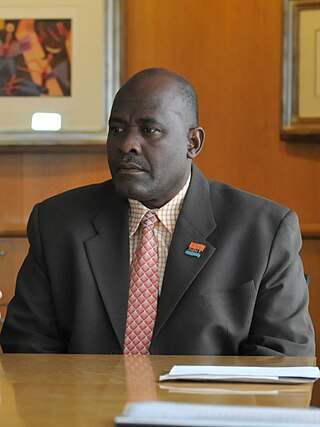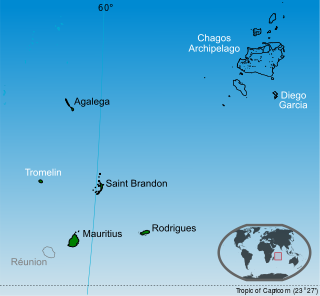An Order-in-Council is a type of legislation in many countries, especially the Commonwealth realms. In the United Kingdom, this legislation is formally made in the name of the monarch by and with the advice and consent of the Privy Council (King-in-Council), but in other countries the terminology may vary. Orders-in-Council are distinct from Orders of Council, which are made in the name of the Council without sovereign approval.

The Chagossians are an Afro-Asian ethnic group originating from freed African slaves brought to the Chagos Islands, specifically Diego Garcia, Peros Banhos, and the Salomon island chain, in the late 18th century as well as people of Asian descent. Under international law, they are the indigenous people of the Chagos archipelago. Most Chagossians now live in Mauritius and the United Kingdom after being forcibly removed by the British government in the late 1960s and early 1970s so that Diego Garcia, the island where most Chagossians lived, could serve as the location for a United States military base. Today, no Chagossians are allowed to live on the island of Diego Garcia or anywhere in the Chagos archipelago, despite many of the islands they used to inhabit being over 160 km away from Diego Garcia.

The British Indian Ocean Territory is an overseas territory of the United Kingdom. It is administered by a Commissioner, located at the Foreign and Commonwealth Office in London. There is no Governor appointed to represent the King in the territory as there are no permanent inhabitants.
In many Commonwealth jurisdictions, the phrase "peace, order, and good government" (POGG) is an expression used in law to express the legitimate objects of legislative powers conferred by statute. The phrase appears in many Imperial Acts of Parliament and Letters Patent, most notably the constitutions of Barbados, Canada, Australia and formerly New Zealand and South Africa.
The United Kingdom, at the request of the United States, began expelling the inhabitants of the Chagos Archipelago in 1968, concluding its forced deportations on 27 April 1973 with the expulsion of the remaining Chagossians on the Peros Banhos atoll. The inhabitants, known at the time as the Ilois, are today known as Chagos Islanders or Chagossians.
The King-in-Council or the Queen-in-Council, depending on the sex of the reigning monarch, is a constitutional term in a number of states. In a general sense, it refers to the monarch exercising executive authority, usually in the form of approving orders, on the advice of the country's privy council or executive council.

Robert John Reed, Baron Reed of Allermuir, is a Scottish judge who has been President of the Supreme Court of the United Kingdom since January 2020. He was the principal judge in the Commercial Court in Scotland before being promoted to the Inner House of the Court of Session in 2008. He is an authority on human rights law in Scotland and elsewhere; he served as one of the UK's ad hoc judges at the European Court of Human Rights. He was also a Non-Permanent Judge of the Court of Final Appeal of Hong Kong.

The British Indian Ocean Territory (BIOT) is an Overseas Territory of the United Kingdom situated in the Indian Ocean, halfway between Tanzania and Indonesia. The territory comprises the seven atolls of the Chagos Archipelago with over 1,000 individual islands, many very small, amounting to a total land area of 60 square kilometres. The largest and most southerly island is Diego Garcia, 27 square kilometres, the site of a Joint Military Facility of the United Kingdom and the United States. Official administration is remote from London, though the local capital is often regarded as being on Diego Garcia.
Campbell v Hall (1774) 1 Cowp 204, 98 ER 1045 was a case decided in the Court of King's Bench in 1774. On its face it was a private action for recovery of sums paid to a tax agent, but the decision laid down the principles of the King's constitutional authority in a British colony, deciding amongst other things that such authority is absolute until a representative assembly is granted, at which point the authority of the Crown is limited.

R v Secretary of State for Foreign and Commonwealth Affairs, ex parte Bancoult [2008] UKHL 61 is a UK constitutional law case in the House of Lords concerning the removal of the Chagos Islanders and the exercise of the Royal Prerogative. The Chagos Islands, acquired by the United Kingdom in 1814, were reorganised as the British Indian Ocean Territory (BIOT) in 1965 for the purpose of removing its inhabitants. Under a 1971 ordinance, the Chagossians were forcibly removed, and the central island of Diego Garcia leased to the United States for use as a military outpost.

Louis Olivier Bancoult is a Chagossian activist for the right of return and the leader of the Chagos Refugee Group (CRG).

Illegality is one of the three broad headings of judicial review of administrative action in Singapore, the others being irrationality and procedural impropriety. To avoid acting illegally, an administrative body or public authority must correctly understand the law regulating its power to act and to make decisions, and give effect to it.

R v Secretary of State for Foreign and Commonwealth Affairs, ex p Bancoult [2000] EWHC Admin 413 was a 2000 legal case in which Olivier Bancoult sought a judicial review of the ordinance which allowed the Chaggosian people to be forcibly removed from their homeland. A divisional court ruled that the ordinance that allowed the removal was "ultra vires" as the power to legislate for "peace, order and good governance" of the territory did not include a power to expel the inhabitants.

Sovereignty over the Chagos Archipelago is disputed between Mauritius and the United Kingdom. Mauritius has repeatedly stated that the Chagos Archipelago is part of its territory and that the United Kingdom claim is a violation of United Nations resolutions banning the dismemberment of colonial territories before independence. On 22 May 2019, the United Nations General Assembly adopted a non-binding resolution declaring that the archipelago was part of Mauritius; 116 countries voted in favor of Mauritius while six opposed it.

Secretary of State for Foreign and Commonwealth Affairs v Yunus Rahmatullah [2012] UKSC 48 is a UK constitutional law case concerning the detention of Yunus Rahmatullah, a Pakistani citizen detained in Iraq, and later Afghanistan, who is alleged to have travelled to Iraq to fight for Al-Qaeda during the Second Iraq War.

R (Miller) v Secretary of State for Exiting the European Union is a United Kingdom constitutional law case decided by the United Kingdom Supreme Court on 24 January 2017, which ruled that the British Government might not initiate withdrawal from the European Union by formal notification to the Council of the European Union as prescribed by Article 50 of the Treaty on European Union without an Act of Parliament giving the government Parliament's permission to do so. Two days later, the government responded by bringing to Parliament the European Union Act 2017 for first reading in the House of Commons on 26 January 2017. The case is informally referred to as "the Miller case" or "Miller I".
Anthony Wilfred Bradley was a British barrister, academic and leading expert in UK constitutional law, social security and human rights.
In public law, abrogation is the proposing away of a right, power or value, by a public body in delegating power or failing to carry out a responsibility or duty. The abrogation of such a responsibility or duty, unless required by primary legislation would amount to an unconstitutional delegation of power to a foreign government or other sovereign power.

Sir Michael John Fordham,, styled The Hon. Mr Justice Fordham, is a judge of the High Court of England and Wales assigned to the King's Bench Division. He was appointed as a Justice of the High Court on 13 January 2020.
This is a list of the judgments given by the Supreme Court of the United Kingdom in the year 2018.










